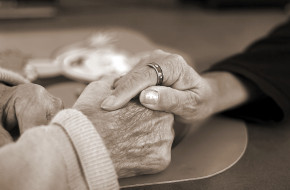Mark and Sarah both noticed the same thing.
It was just after Christmas several years ago when Sarah’s mother called one of her grandchildren by the wrong name.
It was just an honest slip-up, they thought.
But more memory-related concerns arose after that one incident and, eventually, they knew Sarah’s mother, who was widowed, would soon need some type of memory care. They were coming to fear for her safety as she continued to live alone.
Many families quickly become overwhelmed in looking for the best memory-care options. That’s understandable; there are many options and resources available.
But all of us at Diakon Senior Living Services stand ready as experts in senior care to help you review your options and make an informed decision.
Be sure to tour a variety of programs and communities. While proximity to you may be very important, the types of services your loved one requires may not be available as close as you hope, so be open to reviewing all communities, even if they are not as close as you prefer. However, be sure also consider the impact longer-distance travel can have.
To read more tips about how to choose a memory care facility, please click here.




